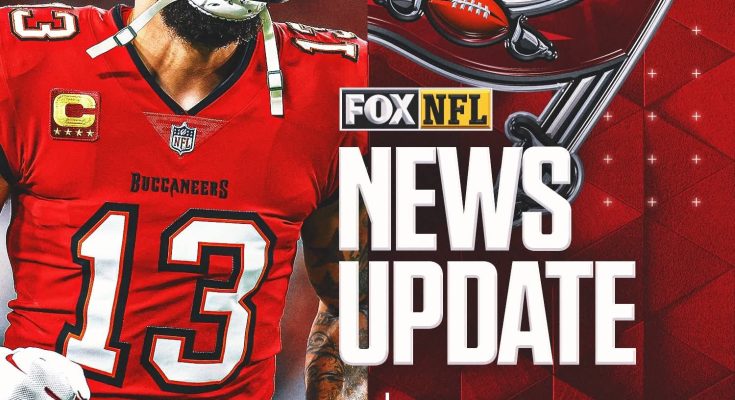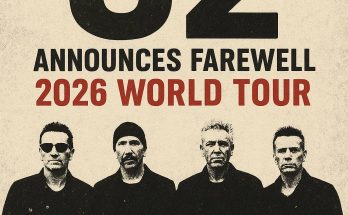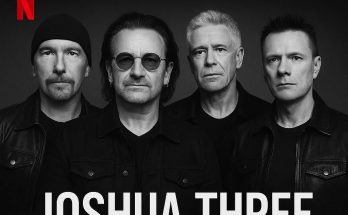According to several sources, Tampa Bay Buccaneers star wide receiver Mike Evans will miss the majority of the 2025 NFL season after suffering a broken clavicle, a devastating blow to both him and the team. The injury occurred during the Buccaneers’ recent game, and head coach Todd Bowles later confirmed that Evans would be sidelined “mostly toward the end of the year.” This statement alone sent shockwaves throughout the organization and among fans, as Evans has been the emotional and statistical leader of the offense for years. His consistency, reliability, and ability to make contested catches have made him one of the most dominant receivers in the league. Losing a player of his caliber at this stage of the season completely reshapes the Buccaneers’ offensive dynamics, as well as their playoff aspirations.
For over a decade, Evans has been a cornerstone of Tampa Bay’s identity. Drafted in 2014, he has been the epitome of durability and excellence, becoming the first player in NFL history to record 1,000 or more receiving yards in each of his first ten seasons. Year after year, even through quarterback changes and coaching shifts, Evans remained the one constant that gave the Buccaneers’ offense its spark. His physical style, elite route-running, and knack for turning short passes into explosive plays made him an indispensable weapon. That is what makes this injury particularly painful — the Bucs lose not just a star, but the heartbeat of their offense.
The nature of the injury itself — a broken clavicle — typically requires six to eight weeks of recovery, sometimes longer depending on the severity and whether surgery is needed. Given the physical demands of Evans’ position, the team will undoubtedly err on the side of caution. Wide receivers rely heavily on upper-body strength for catching, absorbing contact, and maintaining balance during routes. Any lingering pain or limitation in shoulder mobility could risk re-injury or hinder his trademark physical style. If Evans is indeed out for most of the regular season, Tampa Bay faces an uphill battle not just in maintaining offensive production but in morale as well. His presence in the locker room is almost as valuable as his production on the field.
From a tactical perspective, this development forces the Buccaneers’ offensive staff to completely re-evaluate their game plan. Evans is often double-covered by defenses, which opens up opportunities for other receivers and tight ends. Without him, the attention shifts. Chris Godwin will almost certainly take on the WR1 role, a position he’s familiar with but hasn’t been asked to hold consistently since Evans has always been the alpha target. Godwin’s versatility — operating both outside and in the slot — gives the Bucs some flexibility, but defenses will now key in on him far more aggressively. This could make it challenging for him to replicate Evans’ explosive downfield impact.
The next question becomes: who fills the void? Rookie and younger receivers like Trey Palmer or Rakim Jarrett could see an increased workload, while veteran depth pieces may be asked to play above their experience level. Palmer has shown flashes of potential as a deep threat, and his speed could become essential in stretching the field. But experience matters, especially when facing complex defensive schemes. Evans’ ability to read coverage, adjust routes mid-play, and provide a reliable safety valve for the quarterback is something that can’t easily be replaced.
The quarterback situation adds another layer of complexity. Baker Mayfield, who has been trying to establish consistency after years of instability, will have to adapt quickly without his most trusted target. Evans and Mayfield had built strong chemistry, with Evans often bailing out Mayfield on tight throws or under pressure situations. That trust and understanding take years to build, and now Mayfield must rely on less proven connections. Timing routes, back-shoulder throws, and red zone fade passes — all staples of the Bucs’ passing attack — will look drastically different without Evans in the mix.
Offensive coordinator Liam Coen will likely have to adjust the scheme to accommodate for Evans’ absence. Expect to see more two-tight-end sets, heavier reliance on the running game, and short-to-intermediate passing routes designed to move the chains rather than explosive vertical plays. Running backs like Rachaad White may be leaned on more heavily as both runners and receivers out of the backfield. Tampa Bay’s offensive identity might shift toward a more conservative, methodical approach centered around ball control and efficiency rather than the explosive, highlight-reel plays that Evans often provided.
Defensively, the Buccaneers have been solid this season under Bowles, but without Evans helping keep them ahead in games, the defense will likely face longer stretches on the field. This increased workload could lead to fatigue, more pressure, and potential breakdowns in key moments. In short, Evans’ injury impacts all three phases of the game — offense, defense, and special teams — due to the ripple effect his absence creates in game management and momentum.
For the fans, this news is heartbreaking. Mike Evans isn’t just another star player in Tampa Bay — he’s an icon. He was a foundational piece even before Tom Brady’s arrival and the 2021 Super Bowl victory. His loyalty to the franchise, even through lean years, earned him a special place in the hearts of Buccaneers supporters. Every touchdown catch, sideline toe-tap, and acrobatic grab added to his legend. To see him sidelined now, when the Bucs were hoping to make a strong playoff push, feels like a cruel twist of fate. Social media has already been flooded with messages of support, as fans express hope for his full recovery and return before the postseason.
Evans’ absence also has implications for his long-term career. At 32 years old, injuries like a broken clavicle can be particularly concerning. Although not career-threatening, it could mark the beginning of the gradual physical wear that often affects players who’ve been remarkably durable for most of their careers. Evans has always prided himself on his toughness and ability to play through pain, but the Bucs will be careful not to rush him back. The team understands that risking a re-injury could jeopardize not only the rest of this season but also Evans’ effectiveness for future campaigns.
Financially, the timing is sensitive as well. Evans recently signed a two-year extension with the Buccaneers, which was seen as a sign of mutual loyalty and belief in the team’s direction. This injury doesn’t change that bond, but it does create uncertainty about production benchmarks and how the offense will evolve around him as he recovers. Still, Evans’ track record speaks for itself. When healthy, he remains one of the league’s most unguardable receivers — a mismatch against almost any cornerback.
In terms of leadership, Evans’ injury might paradoxically strengthen the team’s unity. Veterans like Godwin, Mayfield, and Lavonte David will likely rally the locker room around the theme of “next man up.” These moments often define a season — whether a team collapses under adversity or finds resilience in the face of it. If the Buccaneers manage to stay competitive, they could enter the final stretch of the season reinvigorated by Evans’ eventual return. The emotional lift of having their captain back for a potential playoff push could create a powerful narrative.
However, the road there won’t be easy. The NFC South remains unpredictable, and every divisional game carries added significance. Without Evans, the Buccaneers’ offense may struggle to maintain scoring consistency against tougher defenses like those of the Saints and Falcons. Red zone efficiency, in particular, could plummet. Evans’ 6-foot-5 frame and physicality make him a nightmare for defenders near the goal line, and his chemistry with Mayfield on fade routes has been one of the team’s most reliable scoring methods. Replacing that in the short term will be close to impossible.
Psychologically, injuries of this magnitude can be difficult for elite athletes to process. Evans is known for his competitive spirit and passion for the game, and being sidelined might be frustrating for someone so accustomed to contributing weekly. Yet, Evans has also shown tremendous maturity and perspective throughout his career. He’s spoken often about using setbacks as motivation, and fans can expect him to channel that energy into his rehabilitation. His presence on the sideline — even if not in uniform — will still serve as inspiration for younger players.
The Buccaneers organization, meanwhile, faces a crucial test of depth and adaptability. Injuries are an unavoidable part of the NFL, but how teams respond often determines their season’s outcome. Bowles has built a defense-oriented, mentally tough culture, and this challenge will reveal how well that philosophy translates to offensive adversity. General manager Jason Licht might also explore midseason acquisitions or free-agent signings to bolster the receiving corps, though finding a player who can replicate Evans’ impact is unlikely.
As Evans begins his recovery, the focus will shift to rehabilitation and long-term readiness. Broken clavicles typically heal fully with proper care, and with modern medical advancements, players often return as strong as before. If all goes well, fans could see Evans back on the field before the playoffs, adding a much-needed boost. His comeback story could very well become one of the defining emotional moments of Tampa Bay’s season — a symbol of perseverance and loyalty in a league defined by unpredictability.
Until then, the Buccaneers must learn to adapt without him. Every snap, every drive, and every game from this point forward will test their resilience and depth. Evans’ injury is a harsh reminder of how quickly fortunes can change in football, but it’s also an opportunity for others to step up and prove their worth. While the team’s offense may lack its familiar explosiveness for now, the spirit Evans instilled in the franchise over the years — of hard work, toughness, and belief — remains deeply rooted. That intangible influence may be the most important thing he leaves behind while he heals.
For now, the Bucs’ season continues under a cloud of uncertainty. Fans will hope that Evans’ recovery progresses smoothly and that the team can hold the line until he returns. Because when Mike Evans finally steps back onto the field, it won’t just be about catching passes again — it will be about restoring belief in what this team can still achieve, even after enduring one of its toughest blows.



